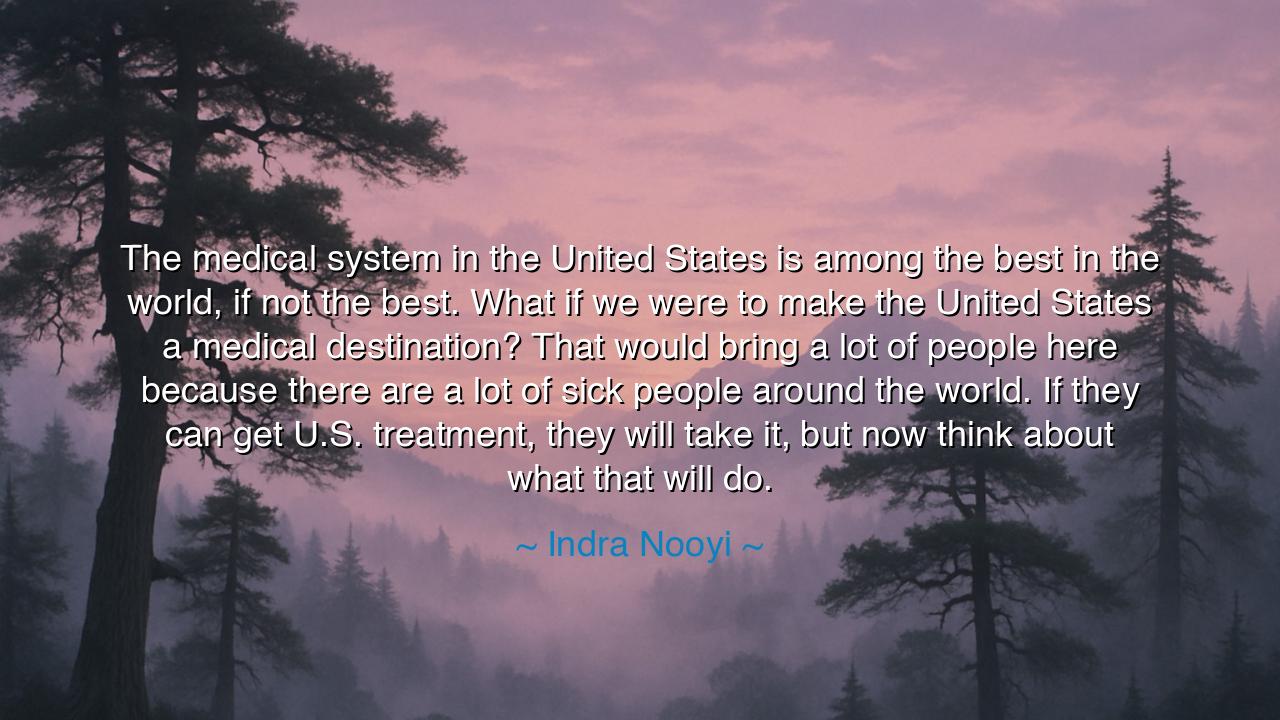
The medical system in the United States is among the best in the
The medical system in the United States is among the best in the world, if not the best. What if we were to make the United States a medical destination? That would bring a lot of people here because there are a lot of sick people around the world. If they can get U.S. treatment, they will take it, but now think about what that will do.






When Indra Nooyi proclaimed, “The medical system in the United States is among the best in the world, if not the best. What if we were to make the United States a medical destination? That would bring a lot of people here because there are a lot of sick people around the world. If they can get U.S. treatment, they will take it, but now think about what that will do,” she was not merely speaking of commerce or national pride. She was raising a vision of power and responsibility: a nation whose healing arts are so advanced that they might serve as a sanctuary for the sick of all lands. Her words stir the imagination, for they pose not only a possibility, but a moral question: what would it mean for one land to hold the mantle of healing for the world?
The origin of this thought lies in the remarkable growth of the American medical system in the twentieth and twenty-first centuries. With its research universities, pharmaceutical giants, and hospitals of astonishing skill, the United States has become the forge of countless medical breakthroughs: antibiotics, organ transplants, genetic therapies, vaccines, and robotic surgeries. Nooyi sees in this not only triumph but opportunity. If those who suffer from distant lands could journey here to receive treatment, then the nation’s healing gifts would not remain confined but would ripple outward, touching humanity itself.
This vision recalls the ancient cities that became centers of knowledge and healing. Alexandria in Egypt, with its library and scholars, drew seekers from every corner of the known world. Baghdad during the Golden Age of Islam housed the House of Wisdom, where medicine flourished under the guidance of Avicenna and al-Razi. Pilgrims traveled across deserts and seas to these centers, knowing that there they would find both knowledge and cure. In the same way, Nooyi imagines the United States as a modern Alexandria — a place where the suffering of nations finds solace, and where the mastery of science becomes the balm of the human race.
But Nooyi also adds the caution: “now think about what that will do.” Here lies the depth of her words. To open the gates of a land as a medical destination is not only to welcome patients but to bear the immense weight of responsibility. Such an influx would strain systems, challenge resources, and test the balance between serving one’s own people and the world beyond. Thus her vision is both heroic and sobering — a call to imagine the heights of service, but also to prepare for the burdens it would bring.
The meaning then becomes clear: greatness in healing cannot remain insular. If a nation holds the power to cure, it must also grapple with how to share it. Just as the wealthiest man is tested not by how much he keeps but by how much he gives, so too the mightiest medical system will be judged not by its private triumphs but by its generosity to the world. This is the moral weight in Nooyi’s challenge.
The lesson for us, as inheritors of this wisdom, is profound. Whether as individuals or nations, when we hold a gift, we must ask how it can serve more than ourselves. To be a medical destination is not only to attract wealth or prestige, but to become a beacon of compassion, to transform knowledge into mercy, and to bind together the human family through care. Just as the ancient healers saw medicine as a sacred calling, so too must we see it as a bond that unites beyond borders.
Practical actions rise from this vision. Support the strengthening of healthcare not only for citizens but for the broader world. Encourage exchange of knowledge, international training, and humanitarian medical missions. Advocate for equity, so that being a “destination” for healing does not mean only the wealthy may enter, but that the suffering of the poor is also relieved. On the personal level, carry forward this spirit by supporting global health initiatives, donating to hospitals abroad, and standing in solidarity with those who fight disease where resources are scarce.
Thus, Nooyi’s words ring like a prophecy: the United States, with its mighty medical system, has the chance to be not merely a nation, but a healer among nations. If it becomes a medical destination, the sick of the world will come, and with them will come both hope and burden. To answer this call with wisdom and generosity is to turn power into greatness, and to carve a legacy not only of science, but of compassion.






AAdministratorAdministrator
Welcome, honored guests. Please leave a comment, we will respond soon